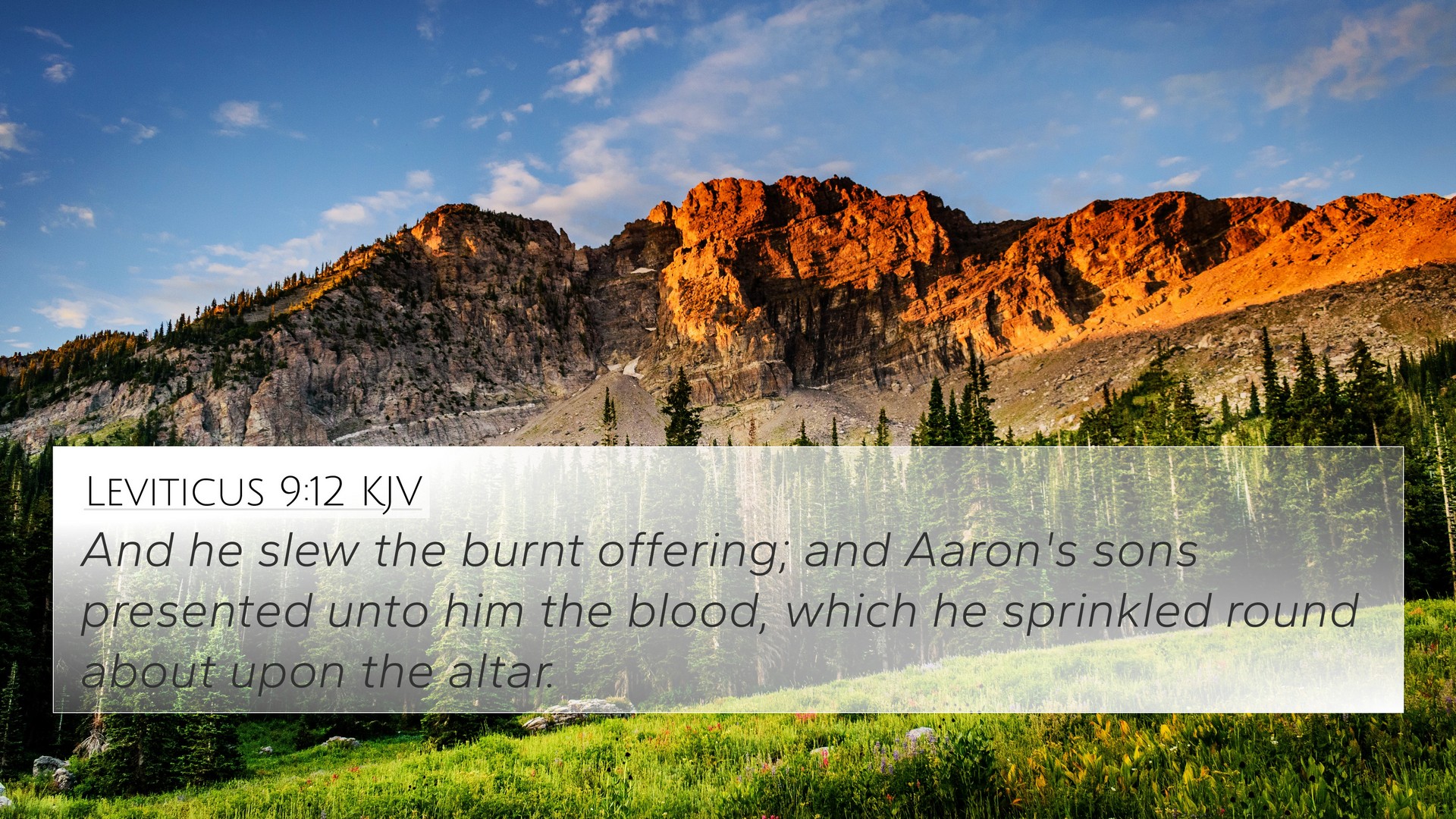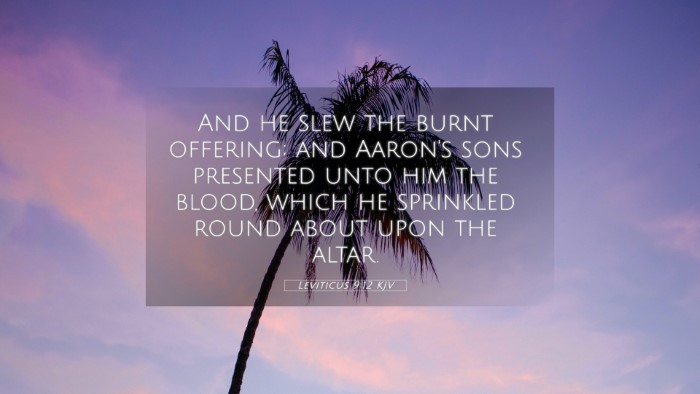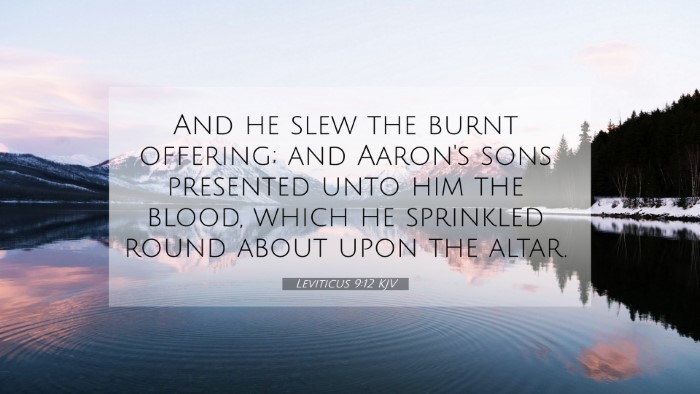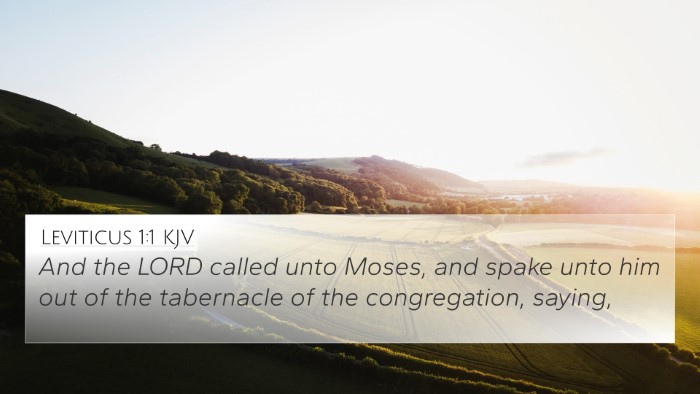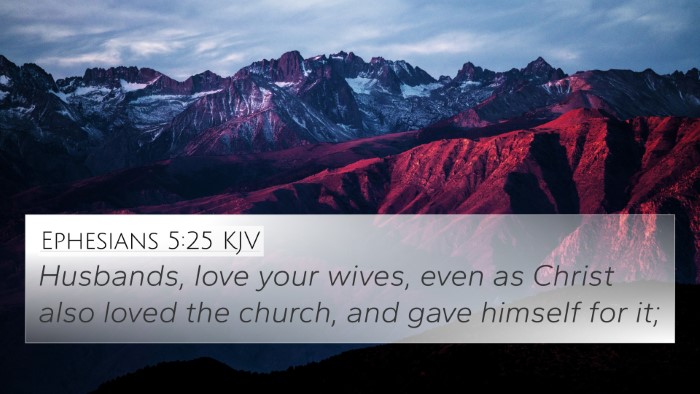Understanding Leviticus 9:12
Leviticus 9:12 states, "And he killed the burnt offering; and Aaron's sons presented unto him the blood, which he sprinkled round about upon the altar." This verse marks a significant moment in the establishment of the Levitical priesthood and the sacrificial system within the context of Israelite worship.
Summary of Leviticus 9:12
This verse outlines the actions taken by Aaron's sons as they assist him in performing the duties of a high priest during the inauguration of the Tabernacle service. The burnt offering is a crucial component of the sacrificial system, symbolizing complete dedication and atonement to God.
Contextual Analysis
Leviticus 9 is set during the period following the establishment of the sanctuary and the priesthood. The entire chapter reflects the seriousness of approaching God and the prescribed methods of worship. Aaron's role as the high priest is emphasized, and the actions of his sons underscore the significance of their calling as priests.
Commentary Insights
-
Matthew Henry: Henry comments on the importance of the burnt offering, noting that it represents the dedication of the whole person to God's service. He emphasizes that the blood signifies atonement and the necessity of bloodshed for the forgiveness of sins.
-
Albert Barnes: Barnes reflects on the procedural aspect of the sacrifices, indicating that the order of service is critical. He highlights that the act of sprinkling the blood around the altar serves as a visible sign of the covenant between God and His people, representing the life that is atoned through sacrifice.
-
Adam Clarke: Clarke discusses the role of Aaron's sons, showcasing the importance of generational continuity in priestly duties. He stresses that this verse illustrates obedience and the proper conduct expected from those in sacred service.
Connections to Other Scripture
Leviticus 9:12 contains essential themes that resonate throughout Scripture—particularly sacrifice, atonement, and priestly duties. Here are some related Bible cross-references:
- Exodus 29:38-42: Instructions for daily sacrifices affirming the ongoing nature of atonement.
- Leviticus 1:3-9: The details of the burnt offering, shedding light on its significance.
- Hebrews 10:1-4: Discusses the fulfillment of the sacrificial system in Christ, reflecting on the inadequacy of animal sacrifices for complete atonement.
- Romans 12:1: A call for believers to present themselves as living sacrifices, paralleling the theme of dedication seen in Leviticus.
- 1 Peter 2:5: Describes believers as a royal priesthood, linking back to the establishment of the Levitical priesthood.
- Matthew 5:23-24: Jesus emphasizes the importance of reconciliation before offering gifts, similar to the requirements of sacrifice in Leviticus.
- Isaiah 53:5: Foreshadows the ultimate sacrifice of Christ, who fulfills the requirements set in the sacrificial system.
Thematic Connections
The themes within Leviticus 9:12 can also be studied with various methods for cross-referencing biblical texts. The concept of sacrifice extends beyond the Old Testament into the New Testament where Jesus becomes the ultimate high priest (Hebrews 4:14) and perfect sacrifice (Hebrews 7:27). This thematic study can enhance our understanding of the interconnectedness of Scripture and God's redemptive plan.
Tools for Bible Cross-Referencing
For those interested in exploring connections between Bible verses, utilizing a Bible concordance or a cross-reference guide can be beneficial. These tools allow readers to identify links and thematic resonances across different books of the Bible.
Study Methods
Engaging in cross-referencing Bible study methods allows believers to deepen their understanding of God's Word. By identifying related themes, users can discover how to effectively prepare sermons or personal studies by examining verses that relate to Leviticus 9:12.
Conclusion
Leviticus 9:12 serves not just as a historical account but as a vital component of the biblical narrative concerning sacrifice and priesthood. The insights from public domain commentaries underscore the importance of this verse in understanding the broader themes of atonement and worship. Efforts in scriptural cross-referencing and thematic studies amplify the richness of one's study of the Bible, revealing how interconnected and cohesive God's revelation truly is.
